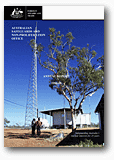


Annual Report 1998-99 |
 |
TWENTY-FIVE YEARS OF SAFEGUARDING AUSTRALIA’S NUCLEAR INTERESTS
It is 25 years since the Australian Safeguards Office (ASO) was established, in July 1974.
Australia joined the Treaty on the Non-Proliferation of Nuclear Weapons (NPT) in 1973. ASO was established in the following year, initially as part of the former Australian Atomic Energy Commission (AAEC), when Australia’s NPT safeguards agreement with the International Atomic Energy Agency (IAEA) was concluded. ASO was designated as Australia’s national safeguards authority, responsible for the performance of this agreement and for facilitating IAEA safeguards activities in Australia.
Australia’s uranium export policy was introduced in 1977. ASO was subsequently transferred to the then Department of National Development and assumed responsibility for the operation of bilateral safeguards agreements. These were established to ensure that nuclear items exported from Australia remain in exclusively peaceful use, and in no way enhance or contribute to any military purpose.
In the 1980s, there was a comprehensive review of the Atomic Energy Act 1953 which led to the replacement of the AAEC by the Australian Nuclear Science and Technology Organisation (ANSTO) in 1987. As part of these changes, the Nuclear Non-Proliferation (Safeguards) Act 1987 was introduced to establish the position of Director of Safeguards as an independent statutory officer and to provide a legal basis for ASO’s functions. With the introduction of this legislation, ASO became part of the new Primary Industries and Energy portfolio.
ASO was relocated from Sydney to Canberra in 1990, ensuring it was better placed to contribute to the process of developing Government policy on safeguards and non-proliferation issues.
In 1994, ASO was transferred to the Foreign Affairs and Trade portfolio and became the responsibility of the Minister for Foreign Affairs. This reflected ASO’s expanding involvement in the strengthening of IAEA safeguards, which assumed particular importance following the Gulf War, and the increasing importance of policy development generally in the area of non-proliferation. The move was also seen to offer significant advantages in efficiency and effectiveness through the co-location with ASO of newly developing functions relating to the Chemical Weapons Convention (CWC), the Biological and Toxin Weapons Convention (BWC) and the Comprehensive Nuclear-Test-Ban Treaty (CTBT).
Australia’s safeguards work is carried out by a handful of highly skilled professional staff. Over the past 25 years, they have made a substantial contribution to Australia’s national security and to Australia’s outstanding position as a supporter of the nuclear non-proliferation regime.